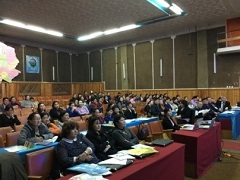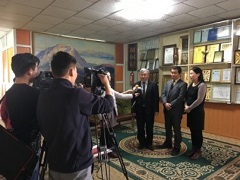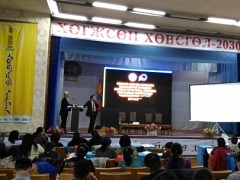Project News
2017-03-29
Held Training Seminars in Khuvsgul Aimag
In October 2016, Khuvsugul Aimag was selected as a pilot area of the Project. It is located about 800 km west of Ulaanbaatar, and has a population of 130,000. Khuvsgul Lake surrounded by coniferous forests, has the second clearest water of lake in the world and is popular among tourists. As the baseline survey to understand situation before the Project's intervention is almost completed, and the Project's first activity, training seminars, were conducted.
At the beginning, the Project conducted a seminar targeting teachers of 2 pilot schools (namely Titem No. 2 School and Ireedui 21 Century Complex School), other schools and kindergartens on March 13 - 15. Its aim was to explain the significance of Individualized Education Plan and how to develop it by utilizing a format and manual developed by special schools in Ulaanbaatar. A specialist from Institute of Education and Research and training managers of Special School No. 25 and 55 also attended as lecturers together with a specialist of Department of Education and Culture and the Project Expert in charge of "Special Needs Education".
On March 28 and 29, another seminar was conducted targeting medical personnel responsible for early detection and teachers of kindergartens and daycare centers responsible for developmental support of the child. Commission of Health, Education, and Social Protection for Children with Disabilities, and its Local Commission, Deputy Director of Rehabilitation Hospital, and the Project Expert in charge of "Assessment Tool Development" promoted appropriate utilization of Maternal and Child Health Handbook and introduced Japanese system of early detection and developmental support for child with disabilities.
Details of the seminars are outlined below:
| Date | Participants | Contents |
|---|---|---|
| March 13 |
|
School and lesson observation |
| March 14 | Department of Education and Culture, Division of Social Policy, Titem No. 2 School, Ireedui 21 Century Complex School, schools in Murun, Bayanzurukh, Ulaan uul, and Renchinlkhumbe soum, kindergartens, Association of Parents with Disabled Children, and daycare centers (totally around 100) |
|
| March 15 |
|
Identified target child and developed her Individualized Education Plan |
| March 28 -29 | Local Commission of Health, Education, and Social Protection for Children with Disabilities, Division of Social Policy, Department of Health, General Hospital, family clinics, Department of Education and Culture, Department of Social Welfare Service, Department of Children and Family Development, kindergartens and daycare centers (totally around 100) |
|
The participants actively participated in the seminars and commented as follows:
- We, teachers from soum have strong will to improve our teaching methods and gain experience. We would like to participate in other training seminars and activities of the Project together with teachers of Aimag center, from now on.
- The training seminar made us notice that daily actions such as greeting, removing a jacket, putting a bag in a proper space, and preparing for learning materials is a part of learning activities. We should organize learning based on those actions and promote children’s independence.
Local TV station interviewed us and this became a precious opportunity to provide information to the public.
 Seminar on March 14
Seminar on March 14
 Interview by local TV station
Interview by local TV station
 Seminar on March 28-29
Seminar on March 28-29
- About JICA
- News & Features
- Countries & Regions
- Our Work
- Thematic Issues
- Types of Assistance
- Partnerships with Other Development Partners
- Climate Change / Environmental and Social Considerations
- Evaluations
- Compliance and Anti-corruption
- Science and Technology Cooperation on Global Issues
- Research
- JICA Development Studies Program / JICA Chair
- Support for the Acceptance of Foreign HRs / Multicultural and Inclusive Community
- Publications
- Investor Relations
